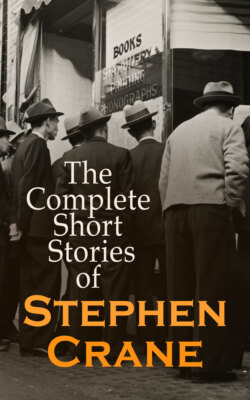Читать книгу The Complete Short Stories of Stephen Crane - Stephen Crane - Страница 47
На сайте Литреса книга снята с продажи.
III
ОглавлениеA man in a maroon-coloured flannel shirt, which had been purchased for purposes of decoration, and made, principally, by some Jewish women on the east side of New York, rounded a corner and walked into the middle of the main street of Yellow Sky. In either hand the man held a long, heavy blue-black revolver. Often he yelled, and these cries rang through a semblance of a deserted village, shrilly flying over the roofs in a volume that seemed to have no relation to the ordinary vocal strength of a man. It was as if the surrounding stillness formed the arch of a tomb over him. These cries of ferocious challenge rang against walls of silence. And his boots had red tops with gilded imprints, of the kind beloved in winter by little sledging boys on the hillsides of New England.
The man's face flamed in a rage begot of whisky. His eyes, rolling and yet keen for ambush, hunted the still door-ways and windows. He walked with the creeping movement of the midnight cat. As it occurred to him, he roared menacing information. The long revolvers in his hands were as easy as straws; they were moved with an electric swiftness. The little fingers of each hand played sometimes in a musician's way. Plain from the low collar of the shirt, the cords of his neck straightened and sank as passion moved him. The only sounds were his terrible invitations. The calm adobes preserved their demeanour at the passing of this small thing in the middle of the street.
There was no offer of fight—no offer of fight. The man called to the sky. There were no attractions. He bellowed and fumed and swayed his revolver here and everywhere.
The dog of the bar-keeper of the Weary Gentleman saloon had not appreciated the advance of events. He yet lay dozing in front of his master's door. At sight of the dog, the man paused and raised his revolver humorously. At sight of the man, the dog sprang up and walked diagonally away, with a sullen head and growling. The man yelled, and the dog broke into a gallop. As it was about to enter an alley, there was a loud noise, a whistling, and something spat the ground directly before it. The dog screamed, and, wheeling in terror, galloped headlong in a new direction. Again there was a noise, a whistling, and sand was kicked viciously before it. Fear-stricken, the dog turned and flurried like an animal in a pen. The man stood laughing, his weapons at his hips.
Ultimately the man was attracted by the closed door of the Weary Gentleman saloon. He went to it, and, hammering with a revolver, demanded drink.
The door remaining imperturbable, he picked a bit of paper from the walk, and nailed it to the framework with a knife. He then turned his back contemptuously upon this popular resort, and, walking to the opposite side of the street and spinning there on his heel quickly and lithely, fired at the bit of paper. He missed it by a half-inch. He swore at himself, and went away. Later, he comfortably fusiladed the windows of his most intimate friend. The man was playing with this town. It was a toy for him.
But still there was no offer of fight. The name of Jack Potter, his ancient antagonist, entered his mind, and he concluded that it would be a glad thing if he should go to Potter's house, and, by bombardment, induce him to come out and fight. He moved in the direction of his desire, chanting Apache scalp music.
When he arrived at it, Potter's house presented the same still, calm front as had the other adobes. Taking up a strategic position, the man howled a challenge. But this house regarded him as might a great stone god. It gave no sign. After a decent wait, the man howled further challenges, mingling with them wonderful epithets.
Presently there came the spectacle of a man churning himself into deepest rage over the immobility of a house. He fumed at it as the winter wind attacks a prairie cabin in the north. To the distance there should have gone the sound of a tumult like the fighting of two hundred Mexicans. As necessity bade him, he paused for breath or to reload his revolvers.
